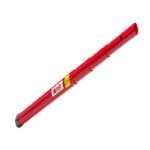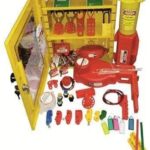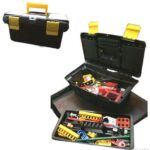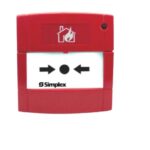Your list is empty, add products to the list to send a request
How to Choose the Right Fire Alarm Type for Your Needs

05
Dec
Choosing the right fire alarm system is a critical decision for safeguarding lives and property. With various fire alarm types available, it’s important to understand their features, functions, and suitability for different environments. This guide will help you navigate the options and select the best fire alarm system for your needs, ensuring you meet safety standards while providing effective protection.
Understanding Fire Alarm Systems
Fire alarms are designed to detect and alert occupants about potential fire hazards, providing crucial time to evacuate and take action. The type of fire alarm system you need depends on factors such as the size of the building, its purpose, and specific risks. Here are the main types of fire alarm systems:
- Conventional Fire Alarms: These systems divide the building into zones, and if an alarm is triggered, it identifies the general area where the issue occurred. While cost-effective, they’re more suitable for smaller premises.
- Addressable Fire Alarms: Ideal for larger buildings, these systems provide precise information about the location of the fire, allowing quicker response.
- Wireless Fire Alarms: These systems are easy to install and maintain, offering flexibility for buildings where wiring is impractical.
- Hybrid Fire Alarms: Combining elements of wired and wireless systems, hybrid alarms are versatile and increasingly popular.
Key Considerations When Choosing a Fire Alarm
Building Size and Layout
The size and layout of your building significantly impact the type of fire alarm you need. For smaller spaces like homes or small offices, a conventional fire alarm may suffice. Larger spaces, such as warehouses, hospitals, or schools, require addressable systems for precise detection and response.
Purpose of the Building
Consider the nature of activities in the building. For example:
- In residential settings, standalone or mains-powered alarms might be enough.
- In commercial environments, addressable systems with advanced features like integration with sprinkler systems are preferable.
- Industrial sites with flammable substances may need intrinsically safe detectors or explosion-proof alarms.
Risk Factors
Evaluate specific risks in your environment. Kitchens, for instance, may require heat detectors rather than smoke detectors to avoid false alarms. Similarly, areas with high humidity or dust might benefit from specialized detectors to maintain reliability.
Benefits of Different Fire Alarm Types
Conventional Systems
- Cost-effective for smaller buildings.
- Easy to install and maintain.
- Simple to use, making them a great choice for basic applications.
Addressable Systems
- Provide detailed information on the exact location of the fire.
- Enable faster response times, reducing potential damage.
- Ideal for large, complex buildings like malls or office towers.
Wireless Systems
- Perfect for heritage buildings or sites where wiring is challenging.
- Quick installation with minimal disruption.
- Easy to expand as needed.
Hybrid Systems
- Offer the reliability of wired systems and the flexibility of wireless ones.
- Useful for buildings with a mix of new and old construction.
Practical Tips for Choosing the Right Fire Alarm
- Conduct a Fire Risk Assessment
A thorough fire risk assessment identifies the hazards in your environment, helping you choose a system tailored to your specific needs. - Consult Fire Safety Professionals
Experts like Fire Supplies can guide you in selecting the right system based on your building’s unique requirements, ensuring compliance with fire safety regulations. - Consider Maintenance and Testing Requirements
Choose a system that fits your ability to maintain and test it regularly. For example, wireless systems might reduce long-term maintenance costs by eliminating wiring issues. - Think About Integration with Other Systems
Modern fire alarms often integrate with other safety measures, such as emergency lighting or sprinkler systems. Ensure your chosen alarm is compatible with these systems. - Future-Proof Your System
Select a scalable system that can adapt to changes, such as building expansions or new regulations. Addressable and hybrid systems are particularly good for this purpose.
Real-World Applications of Fire Alarm Systems
- Residential Homes
In homes, standalone smoke detectors or mains-powered alarms provide effective and affordable protection. For larger homes, a wireless system might be preferable for added coverage without the hassle of extensive wiring. - Commercial Spaces
Office buildings and retail spaces benefit from addressable systems that provide precise alerts. Integration with other safety systems ensures comprehensive protection for employees and customers. - Industrial Sites
Factories and warehouses often require robust systems like explosion-proof alarms or intrinsically safe detectors to handle challenging conditions. - Public Buildings
Schools, hospitals, and government facilities need reliable and scalable systems to protect large numbers of occupants. Addressable alarms with enhanced features are commonly used in these settings.
Avoiding Common Mistakes
- Neglecting Building Codes
Fire alarm systems must comply with local fire safety codes. Failure to do so can lead to penalties and unsafe conditions. - Overlooking False Alarm Risks
Select detectors suited to your environment to minimize false alarms. For instance, use heat detectors in kitchens and beam detectors in warehouses. - Focusing Solely on Cost
While budget is important, prioritize quality and reliability. Cheaper systems may lead to higher maintenance costs or inadequate protection.
Why Choose Fire Supplies?
At Fire Supplies, we understand that every building has unique fire safety needs. Our team provides expert advice and a wide range of fire alarm systems, from conventional to wireless solutions. We ensure that our products meet the highest safety standards, offering peace of mind and dependable protection.
Our services also include installation, maintenance, and testing to keep your fire alarms functioning optimally. Contact Fire Supplies today for personalized guidance and solutions tailored to your needs.
Conclusion
Selecting the right fire alarm system is crucial for ensuring safety and compliance. By understanding your building’s requirements, risks, and specific needs, you can make an informed choice. Whether it’s a simple conventional alarm for a small office or an advanced addressable system for a large facility, Fire Supplies has you covered with reliable products and expert advice.
Take the next step in securing your property—explore our range of fire alarm systems or reach out to our team for assistance. Protect what matters most with Fire Supplies!



























